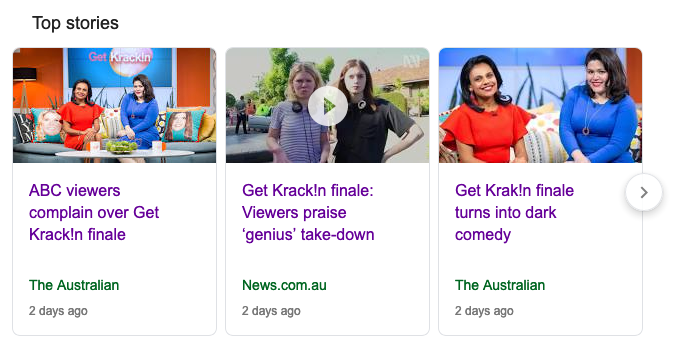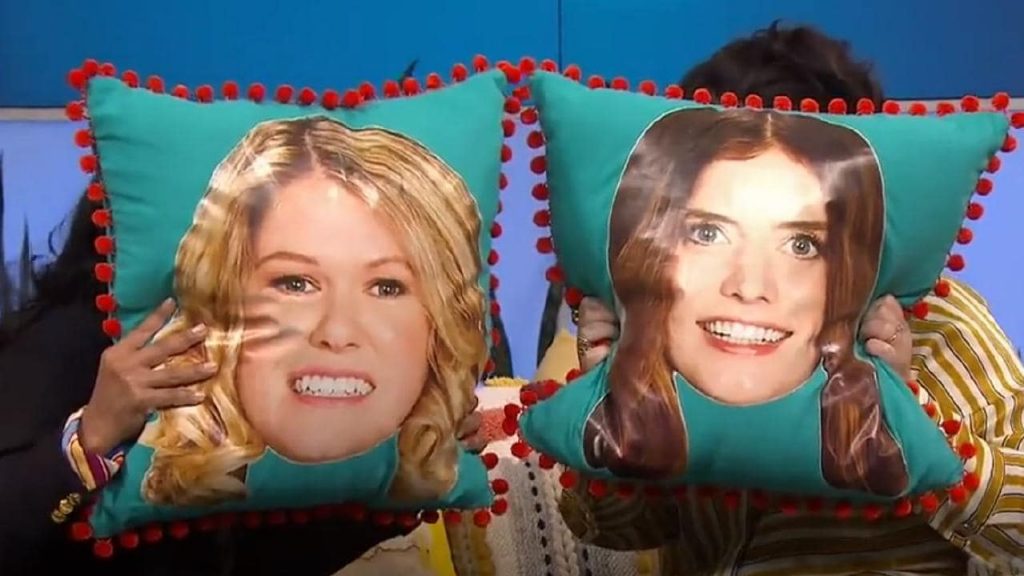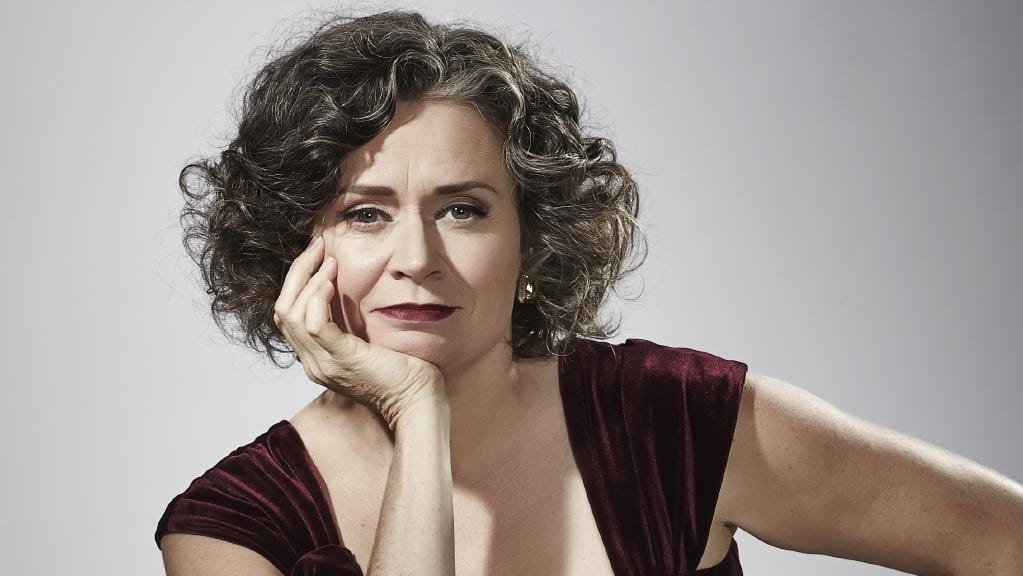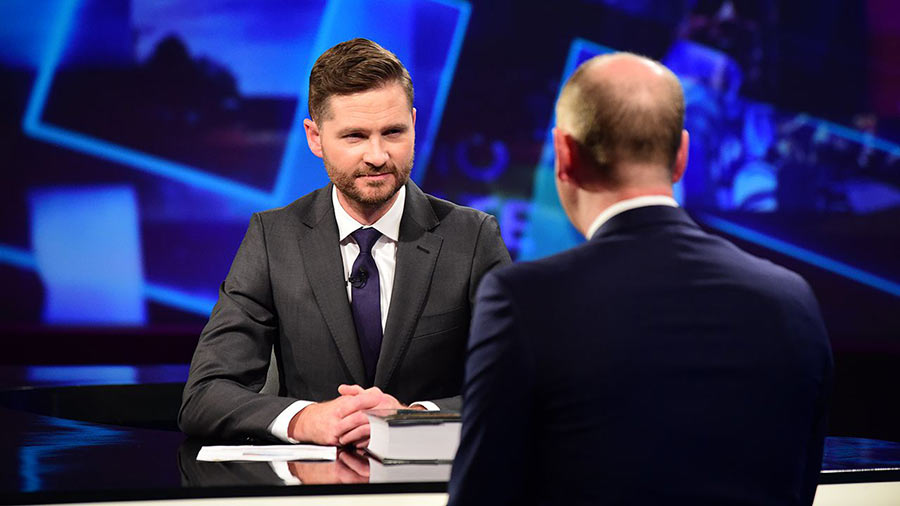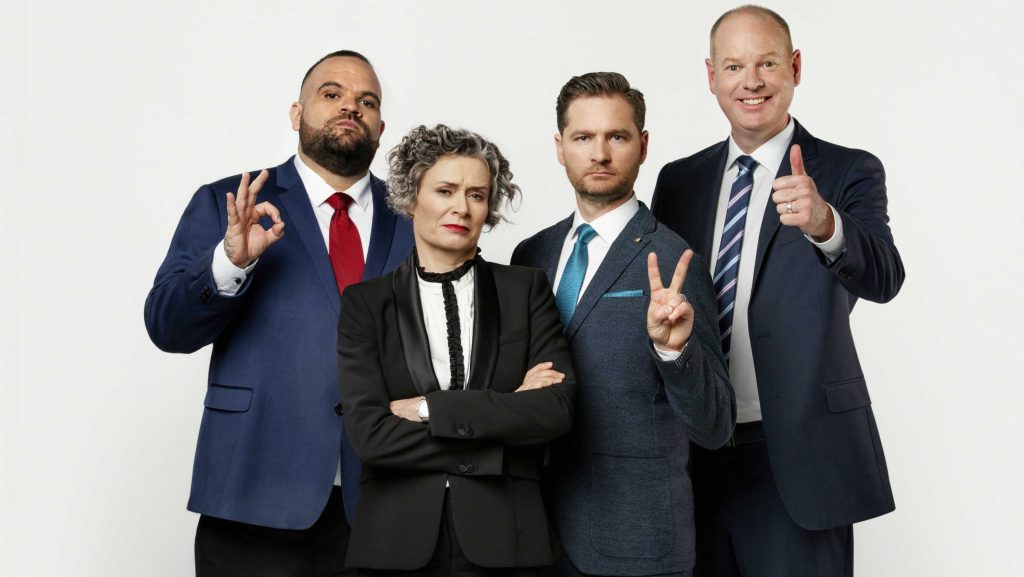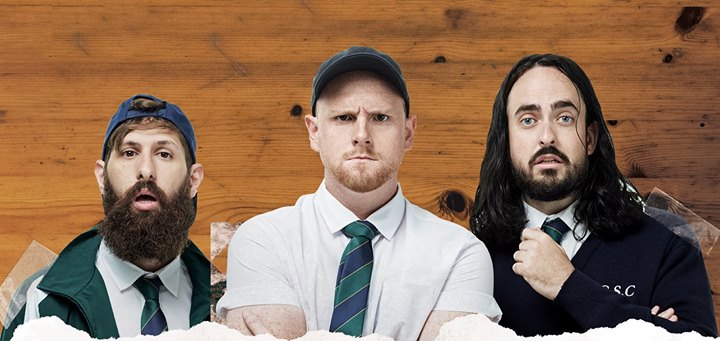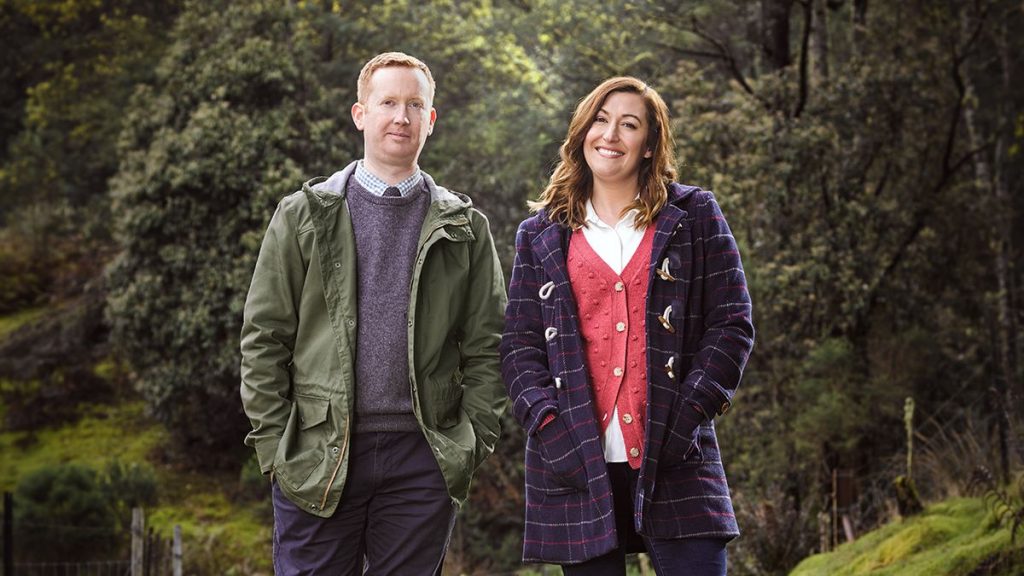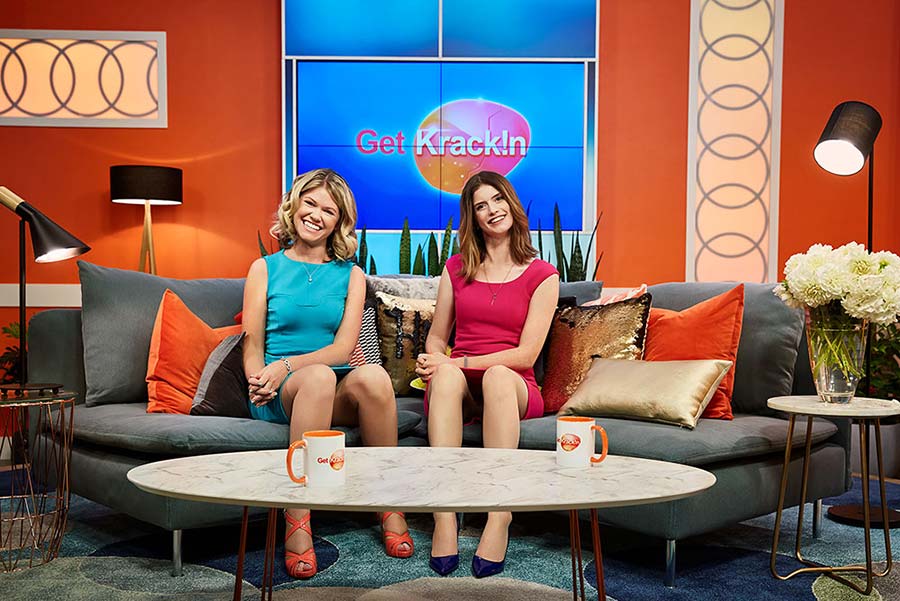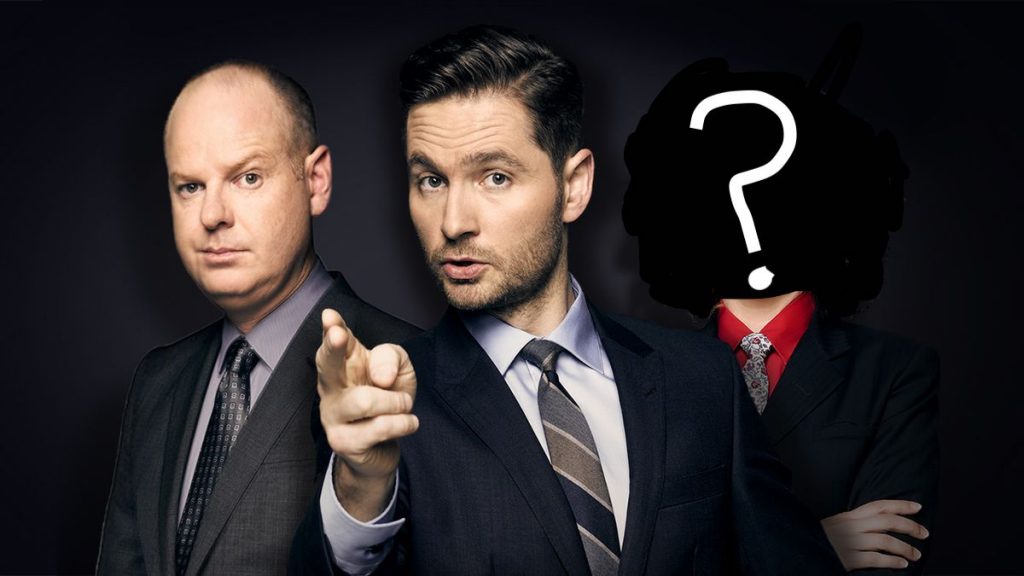Australian Tumbleweeds
Vale Get Krack!n season 2
Australian television hasn’t been known for its parodies for a while now – unless The Weekly really is a parody of a real news satire – so Get Krack!n took a little while for some to get their heads around. Often it wasn’t so much a parody of the style and format of morning television as it was sending up the attitudes behind it. Because those attitudes suck ass.
So while GK could and would run parodies of specific morning TV segments, a lot of the laughs, especially in the second season, came from the way someone would just bluntly express the thinking behind typical morning television segments – or just as often, talk about how that kind of thinking was fucked.
As an comedic approach this has diminishing returns: once the shock wears off, there’s not a whole lot left but the thrill of being told something you probably already know. And the back end of season two felt like it was falling into a bit of a rut, as the wild changes in format from earlier in the season were smoothed out in favour of a series of episodes where the big change week-to-week was the target of the satire (the lack of action on climate change, men). As these had been targets throughout the show – and often went back to being targets even after their big spotlight episode – it occasionally seemed like the series was running in place.
The show hadn’t really built up the collection of regular segments and characters that this kind of series usually relies on either, which was a bit of a mixed blessing. On the one hand, it gave the show a free hand to be whatever it needed to be each week; on the other, having to reinvent the whole thing each week left stretches of the show feeling dragged out to make up the running time. It wouldn’t have hurt to have a few regular segments that could have been adapted to the weekly topic – having a male co-host take over the show might have worked even better if there’d been a stronger idea of what the show actually was.
Having a stronger idea of who the Kates were as comedy characters would have been nice too. The Katering Show was about two friends doing a no budget cooking show that only one of them was into. Dropping those characters into breakfast television seemed like a promising dynamic, but gradually any real differences between the pair faded away. McLennan was always slightly more into it, but where The Katering Show (and early Get Krack!n) would play with this a little (McCartney would stumble into success to McLennan’s horror; McCarthy would surprisingly be excited about something nerdy), by season two both of them were roughly on the same page, which read WE’RE OVER IT.
Not that Get Krack!n was particularly well defined in any direction. Some episodes it was a cartoon where the whole show could be flooded out safe in the knowledge it’d never be mentioned again; in other episodes we needed an explanation as to why the male co-host wouldn’t be coming back (though that did set up that episode’s “no men” premise… which was only really used to have malfunctioning robot cameras).
Still, breakfast TV itself is pretty sloppy, so all this could be read as part of the satire. At least the Kates’ pregnancies was an on-going plotline that went somewhere, unlike that manipulative producer who was constantly mentioned throughout.
(seriously, was she just a plot device to introduce various elements to piss the Kates off? It really felt like it was a subplot that was leading somewhere, but then it just… vanished)
But enough of our griping, because none of this really mattered when it came to the final episode. In fact, a lot of what had seemed like flaws worked in the show’s favour in episode 8; while in-show the development that allowed the Kates to step out of the way on their own show was Kate McLennan going into labor as part of the ongoing pregnancy subplot, it felt like a logical next step for the show in large part because having the Kates walk away from their show felt like where things had been heading for a while.
One of the things Get Krack!n struggled with as it increasingly overtly tackled a range of social issues is that it never quite figured out whether the Kates were part of the problem. Getting indigenous actor-writers Miranda Tapsell and Nakkiah Lui in as their replacements solved that. The show had been openly and aggressively questioning the whole premise of a great deal of Australian television (and Australian society) at a time when POC and women are increasingly getting very, very fed up, and the only safety valve had been having a couple of white women hosting things. Once Miranda and Nakkiah took over, all bets were off.
There are a lot of different ways to be massively unfunny, and playing it safe is perhaps Australia’s favourite. Get Krack!n‘s final episode felt radical because behind all the messages about racism and the high cost of blending in it said something that’s been obvious (in comedy at least) for a while: the status quo in Australian television is dull and lifeless, and when you get rid of the people with nothing left to say the people who replace them are going to be a lot more interesting.
We know we bang on about The Weekly a lot here, but you don’t have to be us to see this episode as a direct retort to five years and counting of Charlie Pickering and Tom Gleeson running the same segments into the ground on The Weekly. Give those spaces to people with something to say and they’re going to make much better use of those spaces.
Of course, not everyone was happy with a finale that challenged the status quo:
The ABC is reviewing allegations of editorial policy breaches after it received a number of complaints relating to the final episode of satire program Get Krack!n.
A spokesman for the national broadcaster confirmed to The Australian it had received “fewer than 20 complaints” about the finale, which attracted 365,000 national viewers on Wednesday night, but said the episode did comply with ABC editorial policy and standards.
“We have received fewer than 20 complaints about the program, along with compliments. We will assess all complaints that allege breaches of ABC editorial policies and deal with them according to our usual processes,” an ABC spokesman said.
The Australian Communications and Media Authority also received a “handful” of complaints relating to the final episode, however referred the complaints back to the ABC.
And no wonder:
Along with being littered with the f-word and c-word, it featured male and female genitalia and ended with Lui attempting to defecate on a cushion featuring the face of a white woman.
Said “white woman” being one of the show’s hosts. But we guess saying “featuring the face of Kate McLennan” wouldn’t have sounded quite so shit-stirry, hey?
Which suggests that from a number of different directions the Get Krack!n finale accomplished everything it set out to do.
Week Sauce
Week two of The Weekly 2019 and one thing is clear: Judith Lucy, brilliant as she is, is not going to save this show.
If you don’t think The Weekly needs saving, fair enough: it’s a solid ratings performer and is also… a show… that exists… But c’mon: having a regular weekly comedy show in Australia is a privilege, not a right, and settling for whatever it is that The Weekly is doing is an abuse of that privilege.
You need look no further than this week’s final episode of Get Krack!n for proof of that. It’s not for us to assume that the Kates were well and truly over their latest show – that’s for their constant firm declarations that this was the final ever episode to say – but they handled things in completely the right way by stepping aside for their final episode and giving the time and space to people who had something new to add.
But The Weekly? Two weeks in and the formula is set, and it’s a formula where Lucy – again, a pleasure and a delight to have back on our screens – is a semi-regular segment presenter while Tom Gleeson is a regular with a segment that stopped being funny two years ago. Gleeson, let’s not forget, has a whole entire different show airing right before The Weekly where he gets to do his act; maybe we don’t need to see him at the desk every single episode this time around?
Of course, The Weekly is basically a tonight show: Pickering is the host, Gleeson is the sidekick / band leader, Lucy is a semi-regular and Briggs is… in all the promo photos. They even have two interviews a night just like a tonight show, only Gleeson gets to do one of them and every guest knows exactly how that’s going to play out.
The thing with tonight shows – at least, the old-fashioned kind – is that occasionally they would mix things up. You had your monologue (just like The Weekly), you had your guests (The Weekly), but you also had the stretch between the monologue and the first guest where the comedy bit would go, which on your better tonight shows was where the show would try new things.
Often they sucked, and more often they were pointless, but the point was that in a way they were giving back: the show was boring and predictable, but to make up for that they would try something new on the off chance it might work out (or even just jolt the late night audience awake).
The Weekly could easily do this. Give Gleeson a few weeks off and try someone new; cut down on one of Pickering’s news reports and try a joke that goes beyond “Here’s our Australian housing market update [cut to shot taken from disaster footage]”. Also, that bit? Not exactly hysterical if you don’t own a house. Only really works if you have investment properties. Maybe not a great way to counter the view that Pickering is fronting a show by and for private school graduates sniffing around for a third holiday home.
Instead, Judith Lucy gets the slot recently vacated by the only other woman on the show and does sketches that are great, but also a break from the “serious” business of the show that Pickering will keep on handling thank you very much. Fuck this shit: if you can’t try something substantially new after five years, either you’re doing everything right or doing everything wrong. This is The Weekly we’re talking about; do we really have to spell it out?
Talkin’ ’bout a Revolution
It’s Melbourne International Comedy Festival time, and you know what that means: we continue to ignore stand up comedy just like we always do. But this year’s launch featured Australia’s biggest comedy superstar, Hannah Gadsby – and in good news, it seems that the future of comedy doesn’t necessarily have to involve jokes:
“I believe there is a revolution in comedy about to happen – a real, big, global revolution … where the joke is not the only tool in a comedian’s kit,” she said.
Guess [insert unfunny comedian’s name here] is breathing a sigh of relief right about now, right guys?
What’s actually interesting about this statement is the way that, while it’s not exactly… wrong… it reflects a reading of Nanette‘s success that doesn’t seem to line up with the facts.
(we’re assuming you know that Nanette was the world-over smash hit that turned Gadsby from a Melbourne-based comedian about to quit comedy to an international superstar now based in LA)
Gadsby has mentioned a whole bunch of times in interviews that for her the big deal about Nanette was that it was a show that didn’t have to rely on jokes (she’s even gone so far as to say it wasn’t really a comedy performance). Not only wasn’t it built around jokes, it was a huge success the world over, therefore – as her comment above seems to suggest – it’s fair to assume its success came about because comedy audiences currently crave performances with more to offer than jokes.
And while reviews of her new show Douglas are currently thin on the ground (it’s only been previewed in Adelaide to date), it does sound like she’s sticking to her guns:
But at its core Douglas is about names and labels, and how they can mean a lot, or very little. They can shape the world, be oppressive and belittling or even a little bit liberating, whether it’s pedants questioning Nanette’s classification as ‘comedy’, living in a world categorised and named by long-dead men or, perhaps, a medical diagnosis.
…
In and around Nanette Gadsby repeatedly said that she needed to quit comedy, and despite that show’s career-making success, she wasn’t wrong: Douglas shows that she’s now doing something quite a bit bigger, whatever you might call it.
So while there might be laughs aplenty in her new show, it also sounds like jokes are no longer the only tool in her kit. But the trouble with this “who needs jokes when you have truth” argument is that it ignores another possible reason why Nanette was so successful:
Gadsby won the festival’s prestigious Barry Award for best show in 2017 with Nanette, which went on to sell out tours in London and New York before being picked up by Netflix. Roundly praised by critics, it was a raw and personal take on her experience of abuse as a young gay woman, which tapped into the #MeToo zeitgeist months before the Weinstein scandal broke.
If anything, “tapped into the zeitgeist” is an understatement. As stand-up comedy (especially in the US) was rocked by various high profile types in the vanguard of artistic expression being revealed as sex pests – ok, it was mainly Louis CK – and across the entertainment industry case after case of high-profile men getting away with sexual harassment – again, mostly Louis CK – came to light, Nanette put Gadsby in exactly the right place at exactly the right time to express a lot of people’s frustrations with both comedy and society in general. It was the kind of art that people flock to as a way of understanding the current cultural moment; it’s highly unlikely Gadsby or Australian comedy will see anything like it for a generation.
Which makes it a little difficult to extrapolate any kind of universal comedy messages from its success. It worked because it struck a nerve, but Gadsby can’t go around saying that other performers need to follow her lead in doing the same kind of material she did in Nanette even though we all know that it was the subject matter that made the show a hit. Yes, it was a well put together show, but does anyone really think it would have done anywhere near as well if it had been about airline food?
(okay, a terminal illness might have worked – but even that isn’t a highly topical subject that roughly half the population are currently angry about)
It also worked because it expressed what was going on in society in a way that left no room for interpretation – not getting the joke isn’t a problem when you don’t really have any jokes. Which again, is fine when you have something to say that people want to hear; when your message is a little more mundane, it really helps to have a few decent laughs scattered in there.
Gadsby is a seasoned comedy professional with a global profile that’s the envy of every single other stand up comedian in the country, but there’s nothing her current success can really teach anyone. There are dozens of stand up comedians who work hard, create good comedy, never really get the success they deserve, decide to put on one final show to really go hell for leather, and then vanish without trace. The difference between them and Gadsby is that for a variety of reasons largely out of her control, Gadsby won the comedy lottery.
Good luck getting a lottery winner to teach you how to do it.
The Weekly Pleads the Fifth
Let’s get one thing straight: the main thing that kept us watching the first episode of the newly returned Weekly was to find out if Briggs was going to be in more than the opening pre-recorded segment. And he wasn’t! Way to start the way you mean to go on, The Weekly. Briggswatch 2019 is go!
Otherwise it was just the same old same old “say things loudly and throw in the occasional pause and hey presto, a regular news story becomes comedy” from host Charlie Pickering. Who knew that saying “There, I said it!” after a news story made it hilarious? Or that repeatedly reminding us that we were watching the start of “Series five” of The Weekly would make us think he was desperately trying to reassure viewers they weren’t watching a repeat because every episode has been basically interchangable since Pickering gave up doing outside segments in week four of series one?
But it was when they showed the #eggboy clip that we really remembered the big problem The Weekly faces above and beyond being shit: unless you have something new to bring to the news cycle, a “week in review” show is completely pointless in 2019. And 2018. And 2017. And pretty much from the day The Weekly began, so we don’t really know what we’re complaining about here.
What’s constantly bizarre about The Weekly is that if there has to be a show with nothing more to it than someone re-reading news stories and slapping a bit of comedy outrage on at the end, why would you put Charlie Pickering in charge of it? Back in the days when Mick Molloy used to go nuts, or even when Dave Hughes used to lose it, there was some comedy value in seeing someone get all worked up. But Pickering? Yeah, nah. Though his head does seem to be gradually turning into a basketball, so that’s a reason to keep coming back.
At least they knew enough to get exciting new correspondent Judith Lucy on board early to let us know she was the show’s new “wellness warrior”, so we’re probably not going to be seeing a lot of Scott Morrison slams during her occasional segments. But hey, there’s booze jokes, references to having fat injected up her clacker, and wellness porn, which all seemed a whole lot fresher when it was followed by a segment titled “The Pedo Files” because that pun was past its use-by date 20 years ago. Mind you, ending a segment on sex offenders with “Moving on, Tom Gleeson is still to come” was definitely not what we expected.
And of course, Gleeson was back, making it two shows in a row in prime time on the National Broadcaster featuring Tom Gleeson, which really does feel like some kind of terrible mistake. Like Pickering, it’s not that he’s rubbish – though basing an entire comedy career on “hey, I’m really committed to acting like a prick” is the kind of thing that definitely edges you towards the rubbish bin after the first decade or so – as it is that he’s just very deeply average.
This is the fifth year of The Weekly, and if you’re the kind of person who gets annoyed when Get Krack!n keeps on making jokes about shitty men here’s a tip: every time the Kates complain about how crappy dudes have it easy, think of Charlie Pickering and Tom Gleeson. Pickering has a show with his name in the title: Gleeson is appearing in two shows back-to-back. And if you think either of them are so good at their jobs that they deserve that kind of free ride after five years of churning out the same utterly disposable pap, we hope you enjoy your position in the senior levels of ABC management.
Back to school with Aunty Donna
Aunty Donna’s new YouTube series Glennridge Secondary College is exactly what we’ve come to expect from Aunty Donna: a series of high-energy sketches riffing on a theme, in this case, life at a typical suburban secondary school.
If the sketches look highly polished, that’s because many of them come from the trio’s live tour from last year, also called Glenridge Secondary College, which we haven’t seen. Another thing that’s notable about this series of sketches is that there’s no narrative or consistent characters across them, which led us to wonder whether that was also the case in the live show.
A quick Google later, and we came across this review of the live show:
Glennridge Secondary College sees the Aunty Donna boys take on a more structured approach than ever before. Instead of their usual brand of nonsensical and disconnected sketches, they’ve reinvented themselves with some nonsensical, connected sketches.
So, there was some sort of storyline or narrative arc in the live show. Perhaps that will become clearer as more sketches are released online (or not).
What’s not in doubt, though, is that this is another good series of sketches from Aunty Donna. Some, like Roll Call, are brilliantly done. School roll calls have been the inspiration for many great sketches over the years (Rowan Atkinson did several hilarious versions of a roll call sketch) but this one is classic Aunty Donna – relentless repetition of a comic idea until it becomes even funnier, plus a hefty dose of comic violence.
Don’t Get In The Kiln, which is equally relentless and violent, works along similar lines, while How To Be Cool takes the relentless repetition and comic violence and throws in a bit of surrealism – oh, and it’s a song.
Speaking of songs, Glennridge Secondary College gets its own school song, which is worth a look, and there’s Best Days of My Life, another riff on school life, which is on the Aunty Donna album.
Less successful, because the three Donnas take the idea of relentless repetition a bit too far, is Ball Games At Lunch, which at more than six minutes outstayed its welcome. Although we enjoyed the teenage extras in the background trying desperately not to laugh as various members of the trio screamed in each other’s faces.
Overall, Glennridge Secondary College is worth seeking out on YouTube. Sure, there’s no story, but that’s not really the point. Aunty Donna are at their best when they’re just focused on making us laugh. And there are far worse comic approaches out there than going for laughs – see the rest of this blog for details.
Vale Rosehaven Yet Again
After McCallum Real Estate accidentally prevented the local council from creating a much-wanted new park, Daniel (Luke McGregor) and Emma (Celia Pacquola) are now town pariahs. Will they be able to ride it out and win back the locals, or is some kind of murder-suicide pact the only way out?
For a show that’s basically the Australian version of those cosy twee rural murder shows the UK pumps out twice a week only with no murder, it’s strange how unconcerned or unable Rosehaven is to deliver the pleasures people expect from this kind of show. For starters, instead of some much-loved but aging out of sexy roles personality playing the lead to appeal to the oldies, we get McGregor and Pacquola, who…
Okay, look: they’re easily the best things in this show, but this never feels like the show they should be in. Obviously the whole idea is a vague “fish out of water” thing – or it was back in season one – but their style of comedy never quite clicks with the rest of the show. Put another way, their banter is pretty good and they have decent chemistry, while the rest of the show’s humour is based around nutty locals and the kind of unfunny business that usually takes place in cosy twee rural murder shows.
The obvious answer there is “be more funny”, but it’s been clear pretty much from the start that this isn’t that kind of show. The setting is meant to be – like we’ve mentioned before – cosy and twee, rather than actually funny. And that’s fine: it’s just that usually in a comedy if you want the setting to be a bland backdrop that’s because you’re getting laughs from somewhere else. But if Daniel and Emma were actual comedy characters rather than pleasant types you’d happily have as neighbours it would wreck the show: this is Seachange, not The League of Gentlemen.
The other thing these kind of shows usually have to keep the audience awake is the occasional feeling that the leads might have sex. Obviously this isn’t going to happen here – remember when McGregor did that show about how he’d never had sex and couldn’t figure out how it worked? – but usually with a show as low stakes as this some kind of sexual tension is vital as far as convincing audiences they haven’t accidentally tuned into a vision of the afterlife.
(yes, Daniel has a girlfriend and he’s got doubts that they’re right for each other and who cares?)
Basically, the real problem with Rosehaven is that you have a low-drama pair of leads in a low-drama setting. This kind of dull setting needs some actual excitement to provide contrast and interest, which is why this kind of dull setting is usually where cosy rural murders take place: meanwhile, these kind of comedy leads need to be put in a place where stuff actually happens to generate some contrast between them and their situation, which is why they’re called “sitcoms” and not “did I just fall asleep?”
That’s not to say nice shows where nothing happens don’t have their place on our televisions, and Rosehaven certainly does make Tasmania look like an enticing holiday destination so job well done there everybody funding this show. But the producers never got the memo that “nice” doesn’t have to mean “boring”; unless you’re unnaturally engaged in the characters of Daniel and Emma there’s just not enough going on in Rosehaven to make regular visits worthwhile.
So of course, this season ended with a happy ending that restored the status quo in every direction and made a fourth season all but inevitable*. On the up side, at least we might get more Anthony Morgan; any chance of a spin-off there?
*especially once the ABC announces at the end of 2019 that it was their most watched comedy on iView this year. You do the math.
You’ll never believe who the new host of The Weekly is
Well, this took us by surprise…
…and yet, in a lot of ways, it makes perfect sense.
Look, we’ll be honest: Team Tumbleweeds is divided on this. Not on whether Judith Lucy is any good, of course: she is, end of story there, no further correspondence will be entered into.
Judith Lucy has always been a divisive figure (go check out the more misogynist comments on the above announcement for more on that) but if she’s not quite in the “Much Loved” category then she’s unquestionably a “Much Loved Cult Figure”, with a sizable and dedicated fanbase. Also she’s funny, so like we say, end of story there.
And we’re not even divided on whether this is a good move for The Weekly – assuming there is anyone out there who thinks The Weekly is doing a good job just as it is. Given that her predecessor Kitty Flanagan was very much following in Lucy’s footsteps when she started out in stand-up in the mid-90s, this isn’t much of a departure. You could even argue that clearly The Weekly has enough nouse to realise their show’s a bit of a blokefest, so who better to change that than Judith Lucy?
As much as Judith Lucy is well above announcing her appointment in crap parody of Married at First Sight, we like her style in calling them out for it, mid-parody. It suggests she won’t be taking Pickering and Gleeson’s smug crap, anyway.
Where we’re divided is on how much of an impact Lucy’s arrival will have on the show. Some say Lucy is such a strong charismatic performer she’s bound to carry the show with her simply by being a regular; others point out that hey, there’s Briggs getting a grand total of zero lines in that promo, guess they’ll keep on having him on once every seven episodes so they can defuse the argument that the show is just a fucking boys club where Pickering and Gleeson glad-hand each other each week.
Lucy isn’t some kind of loose cannon here to blow up the system: she’s a safe pair of hands who’s been a regular on shows like Rove, Hughsey We Have a Problem, The Project and Studio 10, so being funny in short segment form isn’t a big leap for her. And does anyone really think The Weekly in 2019 is going to make her a fully fledged co-host? She’s replacing Kitty Flanagan, so it seems reasonable to assume she’ll be getting the Flanagan slot: five minutes or so two weeks out of three while Tom Gleeson gets two segments every week and Pickering’s name is on the masthead.
Our other big hope for Flanagan’s replacement going into 2019 was that they’d find someone with an explicitly political approach, considering there’s an election coming up and the ABC don’t seem to be interested in lining up any other prime time political comedy. Much as we love Lucy, overtly political comedy isn’t usually her bag and we doubt she’s going to start now. Hopefully they’ll figure out some other way to get more obvious political commentary on the show, because their coverage last year of the Liberal’s leadership spill was embarrassingly shithouse.
And that’s why we’re mixed about this announcement. Lucy is a great performer and anything that puts her on our screens more is to be applauded, but Lucy is also a skilled professional who can and will slot into an established show without rocking the boat. And rocking the boat is something the predictable, boring, and increasingly irrelevant The Weekly desperately needs.
Still, who knows? At least they didn’t hire Kate Langebroek. So, let’s file this under “cautiously optimistic”. Clearly The Weekly can’t be relied on to improve itself this far into proceedings, but hiring the best possible replacement for Kitty Flanagan – and one of the best stand-ups in this country – is a move in the right direction.
Get Green!n
This week’s Get Krack!n was a little different to previous episodes: it was a re-cap show. Forced to come in on a Saturday morning to present a “best bits” package for weekend viewers, the Kates reluctantly took us through the highlights of their past week of environment-themed shows. And if you’ve been watching the past couple of weeks of Get Krack!n and thinking “this could be better”, then this is an episode worth watching, as it was a definite return to form.
Why was it an improvement? Well, we think the highlights format made for a funnier program than the format used in previous episodes of Get Krack!n, where the Get Krack!n show was presented in real time. Sure, with the real time format there’s plenty of comic potential coming from the tension of the Kates having to skip from awful segment to ill-advised segment to downright disastrous segment. But on the flipside, the real time format means that each segment has to be shown in its entirety, whereas with a highlights format only the really funny bits of each segment needs to be shown.
There were also some extra opportunities for gags in the highlights show, by having the weekend crew consisting of film school dudes all keen on doing something a bit artistic – and the Kates having their weekends, nay their lives, ruined by having to do an extra day’s work. And with McLennan now down to zero friends and both McLennan and McCartney’s husbands fairly cheesed off with them, oh, and with the studio carpark flooded, it can’t be long before we find the Kates presenting their final episode from a cardboard box under a railway bridge to an audience of homeless drunks, meth addicts and diseased rodents.
Oh, and speaking of bleak, the usual bleak/woke gags worked particularly well in this episode, it being about an actual real-life disaster that we’re all careering towards and are seemingly powerless to do anything about. We also enjoyed the Kash Kock’s visit to a house with some rather interesting contents, the New Zealanders who’d been “rescued” at sea, and the segment in which various right-wing nut jobs (played by the actor John Howard, Debra Lawrence – is it now mandatory to have her in everything? – and David Quirk) got to have their say on a trivial but potentially flammable social issue.
And with Mark Humphries and Sammy J being not great, and Tonightly still axed, Get Krack!n is proving to be the best satire on TV right now. Not something you’d necessarily expect from a show which is meant to be a parody of morning programs.
Get Krack!n Hits the… wait, what?
Get Krack!n this week tackled the hard-hitting issue of… hang on a sec, we’ll get back to Get Krack!n eventually, but did you see the promo the ABC ran just before (and after) it this week? Let’s hit the big notes:
1): The Weekly will be back March 20th
2): It’s going to have a new “correspondent”
3): They didn’t announce who, and
4): They obviously didn’t announce it in a Married At First Sight parody because that would be pretty demeaning to the mystery new host and… oh hang on a second.
Where to begin with this shit? To get the obvious out of the way first: either they don’t actually have a new correspondent yet or (more likely) whoever they do have is someone we probably haven’t heard of, because otherwise they would be shouting it from the high heavens.
This almost certainly means that our hopes and dreams regarding The Weekly have once again been dashed – instead of hiring someone who could shake up the place, or even just work as a counterbalance to the imperial smugness of Pickering and Gleeson, there’ll be some occasional guest appearances from someone who’s clearly a distant third in the scheme of things. Which was always going to be the case, but we like to keep our hopes alive for recreational purposes.
After all, if you needed any more of a reminder of how much of a boy’s club The Weekly is, just rewatch that promo.
https://www.facebook.com/theweeklytv/videos/818446385187501/
Married At First Sight might be the hottest thing on television right now, but is this really the way the two male hosts of a semi-serious news program want to announce the hiring of their new workmate? No wonder Briggs was nowhere to be seen.
(if it turns out that the new correspondent is a dude, then this promo suddenly becomes a lot better… though The Weekly itself would become much worse)
It’s been a long running sign of just how kak-handed The Weekly is in general that they’ve never really managed to figure out a way to promote it accurately. This promo would work fine for a show that specialised in pop culture parodies and sketch comedy, or even to peddle some kind of doofus panel show where wacky hijinks are the norm. But if you’ve ever watched The Weekly you know that around 70% of it is pretty much straight news with its tie slightly loosened – and yet every single promo for it is trying to flog it as the funniest thing since Fast Forward. Come for the comedy, stay for the seven minute lecture on plastic in the environment.
But the juicy filling in this particular shit sandwich is that air date. Here’s all you need to know:
The 2019 Australian federal election will elect members of the 46th Parliament of Australia. The election will be called following the dissolution or expiry of the 45th Parliament as elected at the 2016 double dissolution federal election.
The next election must be held by 18 May 2019 blah blah blah
It seems the ABC, in their boundless wisdom, has decided that the satirical news program they want to cover the 2019 Federal Election is the toothless sack of used nappies that is, and has consistently been for the last few years, The Weekly. When the nation turns to the ABC for comedy to cut through the waffle flowing freely from this election campaign, they’re going to find Hard Chat working its hardest to make our pollies seem like funny buggers in on the gag and Pickering trying his best to pretend he’s not going to be voting whatever way Daddy’s accountant advises him to.
(our current best guess for the new correspondent? Julie Bishop)
Baseless personal attacks aside, over the last few months there’s been a lot of discussion about the way the ABC board and management have been pandering to the current government. Is giving the prime election comedy slot to their most provably pissweak “satire” program yet another example of this? That’s not for us to say.
What we can say is that if you were an organisation desperately, palms-sweatingly, pants-wetingly afraid of doing anything to annoy your current or future political masters, and you had two satirical news programs to choose from when it came to election coverage, choosing The Weekly would make you look pretty gutless whatever your publicly stated reasons (if any) for doing so.
Having people paying attention to The Weekly for once isn’t exactly good news for anybody either.
The Weekly is coming back, like it or not
The appointment of a new senior member of staff to an existing TV program can tell you a lot about where that program might be heading. This week, the ABC released information about a new appointment to the soon-to-return The Weekly with Charlie Pickering:
Jules Holmes has started as Senior Producer of The Weekly with Charlie Pickering after working as Head of Field of Tomorrow Tonight (ABC). She previously worked on The Project as Field Producer for five-and-a-half years and had also been Creative Director for a number of brand integration campaigns on Network 10.
So, not exactly a comedy appointment, then.
Or is it? From what we can figure out, a field producer typically works on longer pieces, like interviewing someone about a tragedy or a location report covering the aftermath of a disaster, which isn’t exactly comedy material. And Holmes is very highly regarded in that area.
So, The Weekly have hired themselves a very good Senior Producer with experience of producing high-quality, serious, longform pieces. Which is a good thing, as The Weekly‘s previous serious longform pieces have been pretty snooze-worthy. But what is the show going to do to improve its comedy? Are there any plans to hire someone good to work on those? And now that Christopher Pyne’s resigned, they can’t do any more of that Pyne Watch segment (which is a shame, as it was often the funniest thing in the show).
And how’s the hiring a replacement for Kitty Flanagan coming along? Or are we just going to be stuck with these two this series?

